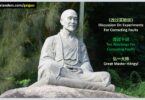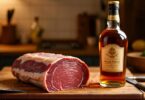供养臂香之意义
[290] Significance Of Offering Arm Incense
臂香者,于臂上然香也。灵峰老人,日持《楞严》、《梵网》二经,故于然香一事,颇为频数。
That arm incense, [is] on [an] arm above burning incense. [As] Língfēng’s [i.e. Spirit Peak] Old Master [i.e. Pure Land Tradition’s Ninth Patriarch Great Master Ǒuyì (净土宗九祖蕅益大师)], [had] daily upholding [of the] Śūraṅgama [and] Brahma Net, [these] two sutras, [he was] thus, with burning [of] incense, [this] one practice, [done] quite frequently.
良以一切众生,无不爱惜自身,保重自身。于他则杀其身,食其肉,心更欢乐。于己则蚊噆芒刺,便难忍受矣。
[This is] really because all sentient beings, [are] without [those] not cherishing one’s own body, [and] taking care [of] one’s own body. Of others, then killing their bodies, [and] eating their flesh, [then with their] minds more joyful. Of oneself, then [by] mosquitoes bitten [and] awns pricked, then difficult [to] bear.
如来于《法华》、《楞严》、《梵网》等大乘经中,称赞苦行。令其然身臂指,供养诸佛,对治贪心及爱惜保重自身之心。
[The] Thus Come [One], in [the] ‘Dharma Flower’, ‘Śūraṅgama’, ‘Brahma Net’ [and] other Great Vehicle sūtras within, praised ascetic practices. Instructing that burning [of the] body, arm [and] finger, [for] making offerings [to] all Buddhas, [is to] remedy [the] greedy mind and [the] mind of cherishing [and] taking care [of] one’s own body.
[Note 1: Ascetic practices (苦行/头陀) (i.e. asceticism) should not be mistaken as extreme ascetic practices (i.e. extreme asceticism). To have ascetic practices is not to neglect or not treasure one’s body, but to live with simplicity and austerity physically, so as to focus more time and efforts on the spiritual path. To have extreme ascetic practices is to live with needless harming of the body. An example is extreme fasting, based on the misconception that there will be happiness at the end of such self-imposed discomfort.]
[Note 2: The advanced practices (i.e. not for beginners) of burning the body, arm and finger should not be mistaken as self-harm or suicide. They are self-sacrificing expressions of rising above greedy attachment to one’s own body, and unshakeable vows to learn and practise the Dharma for benefitting one and all.
The least challenging offering listed is to offer a few (such as three) short incense sticks on a forearm, which also expresses commitment to the Bodhisattva Precepts (菩萨戒). The marks that remain are called precept scars (戒疤), which serve as reminders of commitment to the precepts. The next challenging offering is to burn off the smallest segment of the last finger of one hand, which will not lead to a serious handicap.
The most challenging offering is to burn the whole body, as detailed in the ‘Medicine King Bodhisattva’s Fundamental Practices’ Chapter’ 《药王菩萨本事品》of the ‘Dharma Flower Sūtra’ 《法华经》, who also burnt and spontaneously regenerated both his arms later. Even with his body’s relinquishment, his mind’s commitment to the Bodhisattva practices perpetuated life after life. (Those without this ability are thus not ready for this practice.)
An inspiring example in recent times is that of Dharma Master Thích Quảng Đức (释广德法师), who was able to practise unflinching self-immolation for the greater good while reciting the Buddha’s name, (which thus should not be considered as suicide): https://en.wikipedia.org/wiki/Th%C3%ADch_Qu%E1%BA%A3ng_%C4%90%E1%BB%A9c#Self-immolation.
While all these offerings are made, the mind should retain mindfulness of the Triple Gem or its aspects, such as the Buddha’s name (e.g. Āmítuófó [阿弥陀佛]), perhaps while reciting it verbally too.
These are not literal offerings ‘for’ the Buddhas, but expressions of sincere and serious Dharma practice ‘to’ the Buddhas. As taught by the Buddha, the best offerings are made to the Buddhas by diligently practising the Dharma. From the ‘Medicine King Bodhisattva’s Fundamental Practices’ Chapter’ 《药王菩萨本事品》:
「诸佛同时赞言:『… 是真精进,是名真法供养如来。若以华、香、璎珞、烧香、末香、涂香、天缯、幡盖及海此岸栴檀之香,如是等种种诸物供养,所不能及;假使国城、妻子布施,亦所不及。… 是名第一之施,于诸施中最尊最上,以法供养诸如来故。 』」
‘All Buddhas [at the] same time praised, saying, “… This true diligence, is named [as] true Dharma offering [to the] Thus Come [Ones]. If with flowers, incenses, necklaces, burning incenses, powdered incenses, anointing incenses, heavenly silks, banners, canopies and incenses of [an] ocean [of] this shore’s sandalwood, such [and] other all kinds [of] objects offering, those [are] not able [to] compare. If [with] kingdoms [and] cities, wives [and] children giving, also [with] those not comparable… This [is] named [the] foremost of giving, in all giving within [the] most honoured [and the] most supreme, with [the] Dharma offering all Thus Come [Ones] thus.”’]
[Note 3: From the ‘Brahma Net Bodhisattva Precepts’ Sūtra’ 《梵网菩萨戒经》is the following precept on making the above offerings:
【第十六为利倒说戒】
[Sixteenth (Light) Precept (Against) For Benefits Invertedly Speaking]:
若佛子!应好心先学大乘威仪经律,广开解义味。见后新学菩萨,有从百里千里来求大乘经律,应如法为说一切苦行。若烧身烧臂烧指。若不烧身臂指供养诸佛,非出家菩萨。乃至饿虎狼师子,一切饿鬼,悉应舍身肉手足而供养之,然后一一次第为说正法,使心开意解。而菩萨为利养故,应答不答、倒说经律文字、无前无后、谤三宝说者,犯轻垢罪。
If [as] Buddhas’ [Bodhisattva] disciples, [they] should, [with the] good mind, first learn [the] Great Vehicle’s majestic conduct, Sūtras [and] Discipline, [and] extensively teach [and] explain [their] meanings’ flavour. Seeing later new learning Bodhisattvas, having from [a] hundred lǐs [and a] thousand lǐs come [to] seek [the] Great Vehicle’s Sūtras [and] Discipline, [they] should according [to the] Dharma, for [them] speak [of] all ascetic practices. Perhaps burning [the] body, burning [an] arm, [or] burning [a] finger. If not burning [the] body, arm [or] finger [to] offer [to] all Buddhas, [they are] not Bodhisattvas [who have] departed [from the] household [life]. And even [for] hungry tigers, wolves, lions [and] all hungry ghosts, all [should] relinquish [their] bodies, flesh, hands [and] feet, then offering them, afterwards, one [by] one, sequentially for [them] speaking [the] Right Dharma, [to] enable [their] minds [to be] open [to its] meanings [with] understanding. Yet, those Bodhisattvas, for gains thus, [for what] should [be] answered not answering, invertedly speaking [the] Sūtras [and] Discipline’s words, without [that] before [and] without [that] after, [with that] slandering [the] Triple Gem spoken, commit [a] light defiled transgression.]
此法于六度中,仍属布施度摄。然香然身,皆所谓舍。
These Dharma [practices] within [the] Six Pāramitās, still belong [to] generosity’s pāramitā, [by it] gathered. [With] burning incense [and] burning [the] body, [they are] all those called giving.
[Note 4: Six Pāramitās/ Six Perfections (六波罗蜜/六度): (i) Generosity (布施), (ii) Upholding Precepts (持戒), (iii) Patience (忍辱), (iv) Diligence (精进), (v) Concentration (禅定), (vi) Wisdom (智慧).]
[Note 5: Offerings of body, arm and finger constitute as giving as even though no one, including the Buddhas, have actual use for these physical offerings, they express the ability of ‘giving away’ attachment to what most hold dear.]
必须至心恳切,仰祈三宝加被,唯欲自他业消慧朗,罪灭福增。
[There] must [be with the] sincere mind [and] earnestness, looking upwards [and] praying [to the] Triple Gem [for] blessings, only desiring [one]self [and] others’ [evil] karmas [to be] eliminated [and] wisdom [to be] bright, transgressions [to be] eliminated [and] blessings [to be] increased.
(言自他者,虽实为己,又须以此功德,回向法界众生,故云自他。)
(Speaking [of] that ‘self [and] others’, although truly for oneself, [there] also must [be] with these meritorious virtues, dedicating towards [the] Dharma realm’s sentient beings, thus called ‘self [and] others’.)
绝无一毫为求名闻及求世间人天福乐之心,唯为上求佛道、下化众生而行。
Absolutely without one slightest mind of [that] for seeking fame, and seeking worldly human [and] heavenly blessings [and] joy, only for higher seeking [of the] Buddha path, [and] lower transforming [of] sentient beings then practising.
则功德无量无边,不可思议。所谓三轮体空,四弘普摄。功德由心愿而广大,果报由心愿而速获。
Then [will] meritorious virtues [be] immeasurable, boundless [and] inconceivable. [This is] so-called [with the] three wheels’ essence empty, [and the] Four Great [Vows] universally gathered. Meritorious virtues, due [to the] mind’s aspirations, [are] then vast [and] great. [Karmic] fruits’ results, due [to the] mind’s aspirations, [are] then quickly obtained.
[Note 6: To be with the ‘three wheels’ essence empty’ (三轮体空) is to not be attached to the giver(s) (施者), that given (所施) and the recipient(s) (受者), by knowing that they are all empty (空) in nature, as they are impermanent (无常) and thus with no (fixed) selves (无我).]
[Note 7: Four Great Vows (四弘誓愿):
(i) Of sentient beings boundless, I vow to deliver them. (众生无边誓愿度。)
(ii) Of afflictions inexhaustible, I vow to sever them. (烦恼无尽誓愿断。)
(iii) Of Dharma Doors immeasurable, I vow to learn them. (法门无量誓愿学。)
(iv) Of the Buddha path unsurpassable, I vow to accomplish it. (佛道无上誓愿成。)]
其或心慕虚名,徒以执著之心,效法除着之行。且莫说然臂香,即将全身通然,亦是无益苦行。
[There are] those perhaps [with their] minds longing for false reputation, only with minds of attachment, imitating practice of eliminating attachment. Moreover, not speaking [of] burning arm incense, even [if] with [their] entire bodies completely burnt, [this] also is [an] ascetic practice without benefits.
[Note 8: With such an unskilful motivation, while not being ready to let go of attachment, this supposedly beneficial ascetic practice will become a harmful extreme ascetic practice instead, as explained in Note 1.]
净土宗十三祖印光大师
Pure Land Tradition’s 13th Patriarch Great Master Yìnguāng
《印光法师文钞》(正编):复丁福保书;
Dharma Master Yìnguāng’s Collected Writings (First Compilation): Reply Letter [To] Dīng Fúbǎo;
印光大师文钞菁华录(第两百九十则):八、释普通疑惑:论臂香(第三十九则)
Record [Of] Great Master Yìnguāng’s Collected Writings’ Essence (290th Short Section): 8th [Chapter]: Explanations [On] Common Doubts [And] Confusions: Discussion [On] Arm Incense (39th Short Section)
[Ref: #290 / 8.39]
Namo Amituofo : Translation and notes by Shen Shi’an
下一部分
Next Part:
「相随心现」与「唯心无境」之别
[291] Differences Between ‘Forms Following The Mind Appearing’ And ‘Mind-Only Without A Realm’
https://purelanders.com/2025/06/06/291-differences-between-forms-following-the-mind-appearing-and-mind-only-without-a-realm
上一部分
Previous Part:
佛陀舍利,神变无方
[289] The Buddha’s Śarīras’ Supernatural Transformations Are Without Limits
https://purelanders.com/2025/05/28/289-the-buddhas-sariras-supernatural-transformations-are-without-limits
完整典籍
Complete Text:
《印光大师文钞菁华录》
Record Of Great Master Yìnguāng’s Collected Writings’ Essence
https://purelanders.com/jinghualu





